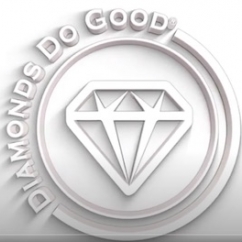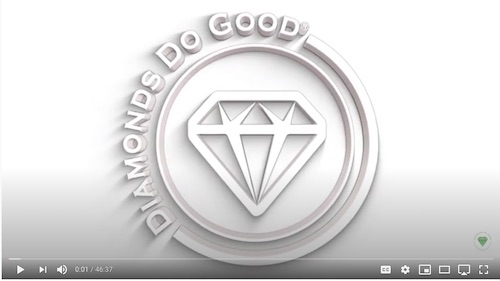Articles and News
Diamonds Do Good Convenes Key Global Leaders To Address The Future | August 05, 2020 (0 comments)

New York, NY—Diamonds Do Good convened an all-star lineup of global industry leaders to offer their perspectives on the future of the diamond and jewelry industry during this unprecedented time. The interactive virtual event featured De Beers Group CEO Bruce Cleaver, Signet Jewelers CEO Virginia Drosos, Alrosa CEO Sergey Ivanov, Rosy Blue managing director Russell Mehta, and Kent Wong, CEO of Chow Tai Fook Jewellery Group Ltd.
The session was introduced by Dr. Benjamin Chavis, civil rights leader and co-founder of Diamonds Do Good.
“Amidst the COVID-19 pandemic throughout world, we find ourselves at a global inflection point. We are the change we want to see in the world. Supporting diversity and inclusion in our workforces and through initiatives will show the world we are an industry that is all about the heart and one that values love above all,” he said.
Key takeaways from the five leaders’ analyses include:
Consumers are looking for gifts of emotional value. Plans for weddings are accelerating as a result of quarantines and lock-downs, boding well for natural diamonds.
“Diamond jewelry is the perfect way to express love and mark milestones along life’s journey, sentimental occasions, or statements of self-expression in a way that is remembered frequently and forever,” said Gina Drosos. “In this COVID-19 environment, lasting mementos of love are a safer and more meaningful alternative to dinners out, trips or other milestone gifts.”
De Beers Group CEO Bruce Cleaver concurred, citing recent research conducted by De Beers. He said, “Consumers are interested in purchasing fewer things and definitely better things. This plays neatly into the diamond space, because these consumers are going to purchase things that matter more to them.
Related: De Beers Group Diamond Insight Report Ready for Free Download
“What we used to think of as completely abnormal has become completely normal. We lost some of the freedoms we have taken for granted but it makes us think, ‘what have I not missed during lockdown, and what I have missed?’”
Human connections really matter, Cleaver said. “Most of our consumers have told us they’ve worn their diamond jewelry throughout lockdown.” De Beers’ research also showed 40% of consumers think diamond jewelry is the most desired gift to give or receive, and the overwhelming majority want classic pieces that stand the test of time.
“Provided we can do our jobs even better in the period leading up to the [holiday] season, we should have a good season,” finished Cleaver.
Russell Mehta, managing director of Rosy Blue, reminded the audience that COVID-19 is a true black swan event. During the global lockdowns, economies ground to a halt but most businesses had only limited options to control costs. Interest and infrastructure costs continued.
Related: How Long Will The Bear Market Last?
He also warned that it will be nearly impossible to get back to normal manufacturing (or anything else) until a vaccine or cure for the virus is found, but even if it’s ready by the end of the year, it’ll be likely closer to the end of 2021 before it’s widely administered. In India, he said, “we need to get used to stop-start situations,” sound advice for the rest of the world as well.
“On the good side, this is a time when the industry can increase its share of wallet and take money that would have been spent on travel and leisure and experiences. Diamond jewelry can celebrate connections with loved ones, so hopefully this will be our silver lining.”
Kent Wong, CEO of Chow Tai Fook, which owns the Hearts On Fire and Mémoire brands as well as retail and manufacturing businesses across China, pointed to pent-up demand in mainland China following the lockdowns.
Sales are positive again, he said, with a lot of weddings being scheduled and a lot more online marketing taking place. “In the next 6-12 months, we’re cautiously optimistic about mainland China. Demand is still strong for weddings, celebrations, self-reward. Jewelry should pick up, especially at the end of the year, and the Chinese New Year in January/February will be a big season.”
Among the lessons learned is that people’s safety has to be the top priority, and technology is a key part of being more agile and customer-centric.
“We have to preserve tradition—design and customer-centric product—but how we use innovation and technology to help us more precisely understand customer needs will be new normal.”
Consumers expect brands to do good and support communities or other good deeds during both good and bad times, emphasized Alrosa CEO Sergey Ivanov.
“The world has changed and this new world is not a safe place anymore. It used to be that living in a developed country you were relatively assured of a safe life. But this crisis has shown that something small can create both economic and other crises.
“The economic crisis is not the only issue. Economies come back, but emotional scars prompt people to face other priorities. Facing illness and death makes them realize what’s really important. Family, friends, and people are what really matter.”
The pandemic has shown that people expect help not only from states and governments, but also from brands and companies they do business with, he said. People want products to have meaning beyond their appearance, and want brands to have values beyond what they build. He highlighted some of the efforts of Alrosa, both in its native Yakutia region of Siberia and in its support of the Brave Of Heart fund in the United States.
Signet CEO Gina Drosos looked back to 2008 for some lessons to apply now. In addition to communicating the emotional value of jewelry, companies need to focus on values as well as value.
“Be the change we want to see. Our values also must reflect society values: justice for all and inclusion.” Values-based buying is on the rise: 60% of consumers will buy or boycott a brand based on how it responds to today’s racial issues, she said. Signet, in addition to being a founding member and three-times certified by the Responsible Jewellery Council, also supports the Heart To Heart COVID response initiative and #StopHateForProfit, a campaign targeting Facebook.
She concurred with Mehta’s assessment that this is a good time for jewelry to grab share of wallet from travel and dining, provided the industry creates enough innovation in the category to keep consumers engaged and buying.
“More than 40% of our purchasers over past few months are new to the Signet family of brands,” she said. The company is leaning into new ways of selling, having trained over 75 virtual sales consultants in the past three months.
“While we’re actively reopening stores, we’re also working on how re-engage with the customer and transitioning to be digital-first omnichannel.”
And no matter what, we need innovation in new products, she said. “We’re counting on vendors to think outside the box and create new concepts and designs to spark customer desire. A diamond engagement ring is a future heirloom in way that a trip to Tahiti will never be,” she said.
Click here or on the image below to watch a recording of the full session.








